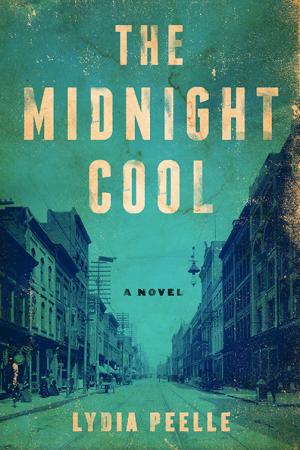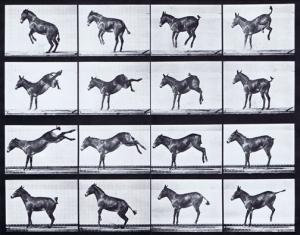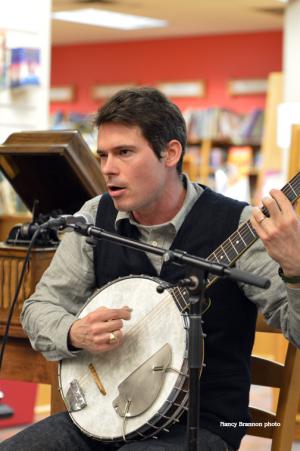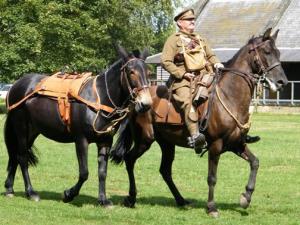Book Review by Nancy Brannon, Ph.D.
On Monday, January 16, 2017, the not-yet-closed Booksellers at Laurelwood, Memphis, TN, hosted a stop of “The Midnight Cool Revue” tour, featuring author Lydia Peelle reading from her first novel, The Midnight Cool. The “revue” included live music by Ketch Secor, of Old Crow Medicine show, on a gitjo, a hybrid instrument combining the qualities of a banjo and a guitar, and recorded music from an antique 1915 Edison Amberola Cylinder player. With backdrop photos in a “kick ass” PowerPoint presentation, as Lydia said, the mood was set to take the audience back to the World War I era and the business of horse and mule trading.
Set in 1916 in Richfield, Tennessee, a fictional town based on Gallatin, TN, the two main characters are traveling grifters and horse traders Charles McLaughlin and Billy Monday. The novel begins as the two buy a beautiful black mare, from rich man Leland Hatcher, whom they think will fetch a huge price. But, The Midnight Cool as the mare is called, turns out to be violent and eventually harms Billy so severely that Charles sells her to the killer buyers. But for a short time before that, Billy thinks he has the secret to taming her – music. As long as he whistles or plays ragtime music he can brush her, ride her, work her. That’s where the Edison cylinder machine plays a role in the novel. “How about that?” Billy says to Charles. “My maniac sweetheart is a ragtime fan.”
Later, Charles lands a steady job providing mules to the British Army during World War I. He buys from Kentucky breeder Pen Pendergrass [“Bred the best mules in the state, Top-shelf asses.”], and sells them through the Roan and Huntington Mule Company.
Throughout the book the two rely on their mare Gin to take them everywhere they need to go. Billy admires her ability to adjust: “Everything she did reminded you that you weren’t worth of it.”
In an interview with The Tennessean, Peelle said that during WWI, almost 300,000 mules were provided to the army from the middle Tennessee area. The Guyton and Harrington Mule Company, a St. Louis-based company with an outpost in Nashville, was shipping mules to the Allied Forces in World War I. Thousands and thousands of Tennessee mules were shipped overseas, used to pack machine guns, pull wagons and stretchers with wounded soldiers, etc. “They were a crucial part of the war effort,” she said. The mules in the interview were courtesy of Reese Brothers Mule Co. of Gallatin, TN.
Writing the book, Peelle immersed herself in researching the history and reading newspapers of the era. Then, comparing that era to the present day, Peelle noticed many similarities in issues of war, class, race, and patriotism. The rider will find little gems that bridge the eras throughout the book.
Ironically, Peelle talks about a used book store, which also sells music cylinders, going out of business. “Soon enough no one’s going to read books. …Soon enough no one’s going to know how to express a true sentiment. Nor spell correctly.”
About not telling the truth: “Ain’t it just the way people do things. Tell a story enough times, it don’t matter that it’s a bald-faced lie. …it becomes good as true.” Catherine to Charles: “I could say anything and you would believe it.” … “The way Billy could tell any story in the world as if it was gospel truth and you’d never know until later that half of it was made up.” Billy, about Leland Hatcher: “A man like that can tell any story and people will believe it. But that doesn’t mean that in the end he won’t have to pay his price.” One chapter in Part II is simply titled: “Where do you get your facts?”
Billy’s insight into horses: “Horses are always here, now. Only here. Always now.”
About George Washington: “General Washington…he’s the father of the American Mule. The American mule was…the general’s greatest contribution to this country. He was a man of the imagination. And the power of the imagination is stronger than the power of the sword, at the end of the day.”
When the U.S. declares war, there is much celebration in Richfield, with a parade and plenty of recruiters and an atmosphere of excitement. Billy sees through the pomp to the ultimate reality: “…All still applauding. And what they were applauding could be said in one word. Death.”
About going to war: “Me [Charles] I’m a textbook isolationist….We’ve got to keep the blinders on. Stay the course here. We ought to take this war as opportunity to improve upon our own self-reliance. There’s no reason why we should need to import any raw material except rubber. But soon enough we should be able to replace rubber.”
“The greatest tragedy of war is the realization that what lies at its center is the human heart.”
“There’s a big difference between a war horse and a war mule. War horse, you’ve got to prepare him, train him to ignore the gunfire and the shells and the confusion of the battlefield. But you can’t train a mule for that. Mule’s too smart. When it comes down to the action, a horse reacts. But a mule thinks, then acts. You can’t simply just inure him to the bullets and shells.”
About being President of the U.S.: “Whoever would want that job would have to be bughouse crazy.”
There are faint themes of women’s suffrage and racial equality throughout the book. Catherine says to Charles: “Liberty. My mother didn’t have it. I don’t. No woman does. Nor the colored folks. I love this country for what it might be. Not what it is. I can see it through a clouded glass, I suppose.”
About the author: Peelle grew up with horses, she was in Pony Club, and now she has come to appreciate mules. “I love them,” she said. “The more I learn about them the more I understand how they were a central part of the human story in the south, in America, and in the world. For me, the mules of World War I brought together all of those things. And discovering all this history in my own backyard, in Nashville, TN, was so exciting! It was like a treasure hunt, to discover that we had this history here in Nashville.”
Peelle was born in Boston and grew up in Massachusetts. She holds an MFA from the University of Virginia and now lives in Nashville, TN. The Midnight Cool Revue travels to Knoxville, TN February 10; to Atlanta, GA February 11, and to Asheville, NC February 12. Find out more at her website: http://www.lydiapeelle.com/
Resources:
The Tennessean article about Peelle and her book: http://www.tennessean.com/story/entertainment/2017/01/05/lydia-peelle-explores-tennessee-history-debut-novel/95157814/
“Love and Money in Wartime,” http://chapter16.org/?s=The+Midnight+Cool
On Monday, January 16, 2017, the not-yet-closed Booksellers at Laurelwood, Memphis, TN, hosted a stop of “The Midnight Cool Revue” tour, featuring author Lydia Peelle reading from her first novel, The Midnight Cool. The “revue” included live music by Ketch Secor, of Old Crow Medicine show, on a gitjo, a hybrid instrument combining the qualities of a banjo and a guitar, and recorded music from an antique 1915 Edison Amberola Cylinder player. With backdrop photos in a “kick ass” PowerPoint presentation, as Lydia said, the mood was set to take the audience back to the World War I era and the business of horse and mule trading.
Set in 1916 in Richfield, Tennessee, a fictional town based on Gallatin, TN, the two main characters are traveling grifters and horse traders Charles McLaughlin and Billy Monday. The novel begins as the two buy a beautiful black mare, from rich man Leland Hatcher, whom they think will fetch a huge price. But, The Midnight Cool as the mare is called, turns out to be violent and eventually harms Billy so severely that Charles sells her to the killer buyers. But for a short time before that, Billy thinks he has the secret to taming her – music. As long as he whistles or plays ragtime music he can brush her, ride her, work her. That’s where the Edison cylinder machine plays a role in the novel. “How about that?” Billy says to Charles. “My maniac sweetheart is a ragtime fan.”
Later, Charles lands a steady job providing mules to the British Army during World War I. He buys from Kentucky breeder Pen Pendergrass [“Bred the best mules in the state, Top-shelf asses.”], and sells them through the Roan and Huntington Mule Company.
Throughout the book the two rely on their mare Gin to take them everywhere they need to go. Billy admires her ability to adjust: “Everything she did reminded you that you weren’t worth of it.”
In an interview with The Tennessean, Peelle said that during WWI, almost 300,000 mules were provided to the army from the middle Tennessee area. The Guyton and Harrington Mule Company, a St. Louis-based company with an outpost in Nashville, was shipping mules to the Allied Forces in World War I. Thousands and thousands of Tennessee mules were shipped overseas, used to pack machine guns, pull wagons and stretchers with wounded soldiers, etc. “They were a crucial part of the war effort,” she said. The mules in the interview were courtesy of Reese Brothers Mule Co. of Gallatin, TN.
Writing the book, Peelle immersed herself in researching the history and reading newspapers of the era. Then, comparing that era to the present day, Peelle noticed many similarities in issues of war, class, race, and patriotism. The rider will find little gems that bridge the eras throughout the book.
Ironically, Peelle talks about a used book store, which also sells music cylinders, going out of business. “Soon enough no one’s going to read books. …Soon enough no one’s going to know how to express a true sentiment. Nor spell correctly.”
About not telling the truth: “Ain’t it just the way people do things. Tell a story enough times, it don’t matter that it’s a bald-faced lie. …it becomes good as true.” Catherine to Charles: “I could say anything and you would believe it.” … “The way Billy could tell any story in the world as if it was gospel truth and you’d never know until later that half of it was made up.” Billy, about Leland Hatcher: “A man like that can tell any story and people will believe it. But that doesn’t mean that in the end he won’t have to pay his price.” One chapter in Part II is simply titled: “Where do you get your facts?”
Billy’s insight into horses: “Horses are always here, now. Only here. Always now.”
About George Washington: “General Washington…he’s the father of the American Mule. The American mule was…the general’s greatest contribution to this country. He was a man of the imagination. And the power of the imagination is stronger than the power of the sword, at the end of the day.”
When the U.S. declares war, there is much celebration in Richfield, with a parade and plenty of recruiters and an atmosphere of excitement. Billy sees through the pomp to the ultimate reality: “…All still applauding. And what they were applauding could be said in one word. Death.”
About going to war: “Me [Charles] I’m a textbook isolationist….We’ve got to keep the blinders on. Stay the course here. We ought to take this war as opportunity to improve upon our own self-reliance. There’s no reason why we should need to import any raw material except rubber. But soon enough we should be able to replace rubber.”
“The greatest tragedy of war is the realization that what lies at its center is the human heart.”
“There’s a big difference between a war horse and a war mule. War horse, you’ve got to prepare him, train him to ignore the gunfire and the shells and the confusion of the battlefield. But you can’t train a mule for that. Mule’s too smart. When it comes down to the action, a horse reacts. But a mule thinks, then acts. You can’t simply just inure him to the bullets and shells.”
About being President of the U.S.: “Whoever would want that job would have to be bughouse crazy.”
There are faint themes of women’s suffrage and racial equality throughout the book. Catherine says to Charles: “Liberty. My mother didn’t have it. I don’t. No woman does. Nor the colored folks. I love this country for what it might be. Not what it is. I can see it through a clouded glass, I suppose.”
About the author: Peelle grew up with horses, she was in Pony Club, and now she has come to appreciate mules. “I love them,” she said. “The more I learn about them the more I understand how they were a central part of the human story in the south, in America, and in the world. For me, the mules of World War I brought together all of those things. And discovering all this history in my own backyard, in Nashville, TN, was so exciting! It was like a treasure hunt, to discover that we had this history here in Nashville.”
Peelle was born in Boston and grew up in Massachusetts. She holds an MFA from the University of Virginia and now lives in Nashville, TN. The Midnight Cool Revue travels to Knoxville, TN February 10; to Atlanta, GA February 11, and to Asheville, NC February 12. Find out more at her website: http://www.lydiapeelle.com/
Resources:
The Tennessean article about Peelle and her book: http://www.tennessean.com/story/entertainment/2017/01/05/lydia-peelle-explores-tennessee-history-debut-novel/95157814/
“Love and Money in Wartime,” http://chapter16.org/?s=The+Midnight+Cool












